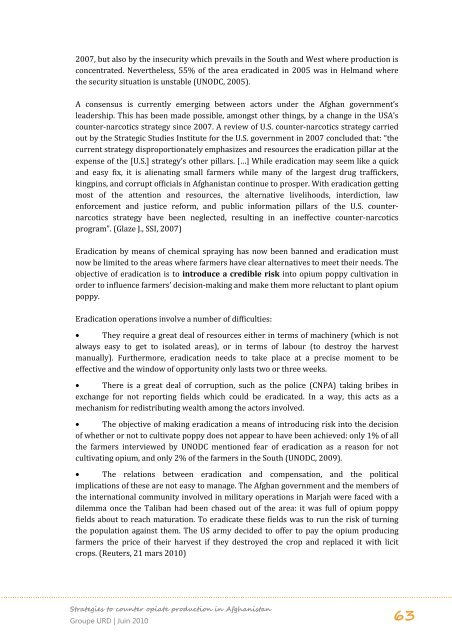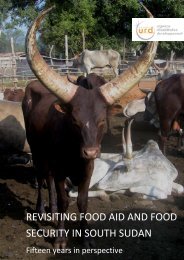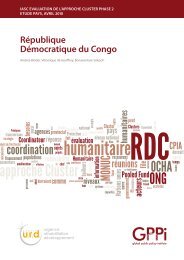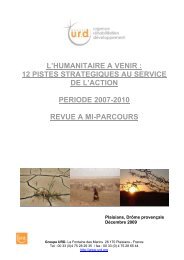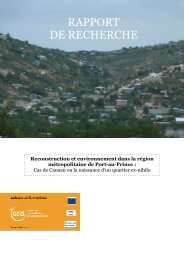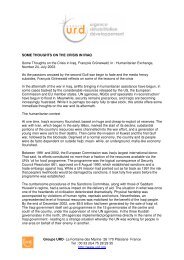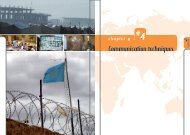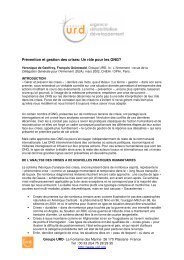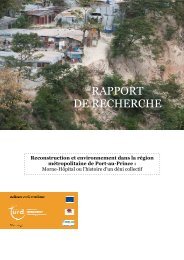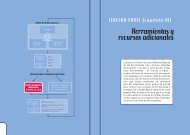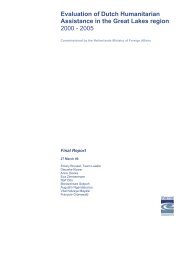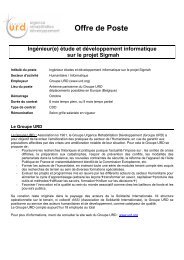strategies to counter opiate in Afghanistan - Groupe URD
strategies to counter opiate in Afghanistan - Groupe URD
strategies to counter opiate in Afghanistan - Groupe URD
Create successful ePaper yourself
Turn your PDF publications into a flip-book with our unique Google optimized e-Paper software.
2007, but also by the <strong>in</strong>security which prevails <strong>in</strong> the South and West where production is<br />
concentrated. Nevertheless, 55% of the area eradicated <strong>in</strong> 2005 was <strong>in</strong> Helmand where<br />
the security situation is unstable (UNODC, 2005).<br />
A consensus is currently emerg<strong>in</strong>g between ac<strong>to</strong>rs under the Afghan government’s<br />
leadership. This has been made possible, amongst other th<strong>in</strong>gs, by a change <strong>in</strong> the USA’s<br />
<strong>counter</strong>-narcotics strategy s<strong>in</strong>ce 2007. A review of U.S. <strong>counter</strong>-narcotics strategy carried<br />
out by the Strategic Studies Institute for the U.S. government <strong>in</strong> 2007 concluded that: “the<br />
current strategy disproportionately emphasizes and resources the eradication pillar at the<br />
expense of the [U.S.] strategy’s other pillars. […] While eradication may seem like a quick<br />
and easy fix, it is alienat<strong>in</strong>g small farmers while many of the largest drug traffickers,<br />
k<strong>in</strong>gp<strong>in</strong>s, and corrupt officials <strong>in</strong> <strong>Afghanistan</strong> cont<strong>in</strong>ue <strong>to</strong> prosper. With eradication gett<strong>in</strong>g<br />
most of the attention and resources, the alternative livelihoods, <strong>in</strong>terdiction, law<br />
enforcement and justice reform, and public <strong>in</strong>formation pillars of the U.S. <strong>counter</strong>narcotics<br />
strategy have been neglected, result<strong>in</strong>g <strong>in</strong> an <strong>in</strong>effective <strong>counter</strong>-narcotics<br />
program”. (Glaze J., SSI, 2007)<br />
Eradication by means of chemical spray<strong>in</strong>g has now been banned and eradication must<br />
now be limited <strong>to</strong> the areas where farmers have clear alternatives <strong>to</strong> meet their needs. The<br />
objective of eradication is <strong>to</strong> <strong>in</strong>troduce a credible risk <strong>in</strong><strong>to</strong> opium poppy cultivation <strong>in</strong><br />
order <strong>to</strong> <strong>in</strong>fluence farmers’ decision-mak<strong>in</strong>g and make them more reluctant <strong>to</strong> plant opium<br />
poppy.<br />
Eradication operations <strong>in</strong>volve a number of difficulties:<br />
• They require a great deal of resources either <strong>in</strong> terms of mach<strong>in</strong>ery (which is not<br />
always easy <strong>to</strong> get <strong>to</strong> isolated areas), or <strong>in</strong> terms of labour (<strong>to</strong> destroy the harvest<br />
manually). Furthermore, eradication needs <strong>to</strong> take place at a precise moment <strong>to</strong> be<br />
effective and the w<strong>in</strong>dow of opportunity only lasts two or three weeks.<br />
• There is a great deal of corruption, such as the police (CNPA) tak<strong>in</strong>g bribes <strong>in</strong><br />
exchange for not report<strong>in</strong>g fields which could be eradicated. In a way, this acts as a<br />
mechanism for redistribut<strong>in</strong>g wealth among the ac<strong>to</strong>rs <strong>in</strong>volved.<br />
• The objective of mak<strong>in</strong>g eradication a means of <strong>in</strong>troduc<strong>in</strong>g risk <strong>in</strong><strong>to</strong> the decision<br />
of whether or not <strong>to</strong> cultivate poppy does not appear <strong>to</strong> have been achieved: only 1% of all<br />
the farmers <strong>in</strong>terviewed by UNODC mentioned fear of eradication as a reason for not<br />
cultivat<strong>in</strong>g opium, and only 2% of the farmers <strong>in</strong> the South (UNODC, 2009).<br />
• The relations between eradication and compensation, and the political<br />
implications of these are not easy <strong>to</strong> manage. The Afghan government and the members of<br />
the <strong>in</strong>ternational community <strong>in</strong>volved <strong>in</strong> military operations <strong>in</strong> Marjah were faced with a<br />
dilemma once the Taliban had been chased out of the area: it was full of opium poppy<br />
fields about <strong>to</strong> reach maturation. To eradicate these fields was <strong>to</strong> run the risk of turn<strong>in</strong>g<br />
the population aga<strong>in</strong>st them. The US army decided <strong>to</strong> offer <strong>to</strong> pay the opium produc<strong>in</strong>g<br />
farmers the price of their harvest if they destroyed the crop and replaced it with licit<br />
crops. (Reuters, 21 mars 2010)<br />
Strategies <strong>to</strong> <strong>counter</strong> <strong>opiate</strong> production <strong>in</strong> <strong>Afghanistan</strong><br />
<strong>Groupe</strong> <strong>URD</strong> | Ju<strong>in</strong> 2010<br />
63


